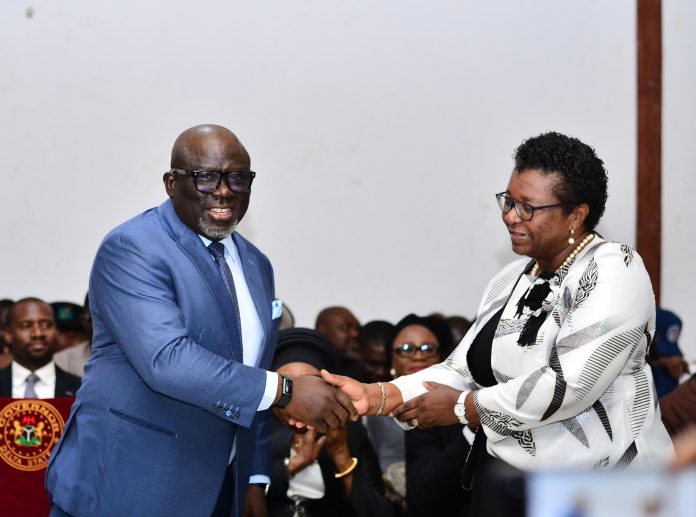The recent inauguration of Dr (Mrs) Mininim OsejI as the 12th Head of Service marks a pivotal moment for Delta State’s public administration. Governor Sheriff Oborevwori’s encomium of her thoroughness, integrity and decades of exemplary stewardship sets a clear expectation: the machinery of governance must be driven by character, competence and a shared commitment to public welfare, rather than by mere compliance or routine.
At its essence, the civil service exists to translate policy into tangible improvements in citizens’ lives. When officers view their roles as privileges to serve rather than entitlements, absenteeism and perfunctory effort give way to a genuine sense of duty. At Oseji’s inauguration ceremony in Asaba, Governor Oborevwori noted that the primary function of the public service is to help the duly elected government, under law, to serve the public interest. To honour that covenant, every public servant must internalize the conviction, “I am the government,” recognizing that punctual attendance and purposeful action are non‑negotiable pillars of good governance.
The task before the new Head of Service becomes weightier considering that decades‑old norms have too often rewarded longevity rather than performance. A modern civil service demands a radical shift: clear performance targets, quarterly appraisals and 360‑degree feedback mechanisms that tie promotions and rewards to demonstrable results. By repositioning merit as the engine of career progression, the new Head of Service can dismantle entrenched silos, extinguish “sharp practices,” and breathe fresh energy into teams whose dedication has too long been eclipsed by bureaucratic inertia.
More so, the disturbing rise in allegations of sexual harassment, financial misappropriation and other forms of misconduct in the public sector cannot be ignored. Dr. Oseji must institute robust, impartial investigative protocols, confidential reporting channels and prompt sanctions that deter potential offenders and safeguard victims. Only through transparent accountability can the civil service restore public confidence and reaffirm its role as a beacon of integrity.
Again, governance challenges today cut across multiple ministries and agencies—from health and education to infrastructure and social welfare. Fostering genuine collaboration requires more than ad hoc meetings; it demands institutionalized cross‑departmental task forces, joint training programmes and regular “policy labs” where officers co‑create solutions. By dismantling the “us versus them” mentality, the civil service will leverage diverse expertise, accelerate project delivery and unlock innovations that siloed operations simply cannot produce.
Undoubtedly, meeting the aspirations of Deltans hinges on modern tools and continuous learning. Investments in digital infrastructure—proper broadband connectivity, cloud‑based document management and improved e‑governance platforms—must accompany structured capacity‑building initiatives. Better remuneration, performance‑linked incentives and clear career pathways will attract and retain top talent while shielding officers from undue political interference ensures decisions remain guided by professionalism rather than patronage.
In addition, Governor Oborevwori’s reminder that “your example is your most powerful leadership tool” strikes at the heart of transformative change. As the foremost civil servant in the state, Dr. Oseji’s personal conduct—punctuality, transparency in decision‑making and fairness in staff interactions—will set the tone for the entire workforce. Regular sessions, open‑door office hours and visible participation in frontline duties will reinforce the message that leadership and service are inseparable.
Accountability must extend beyond internal audits to embrace open dialogue with citizens. The Head of Service should champion mechanisms such as quarterly “citizens’ scorecards,” where service delivery statistics and feedback are published online and discussed in public forums. Such transparency not only empowers citizens but also incentivizes Ministries, Departments and Agencies (MDAs) to exceed baseline targets, knowing their performance is subject to public scrutiny.
No reform occurs in isolation. Strategic partnerships with private‑sector entities—particularly in areas of technology, training and infrastructure—and collaborations can amplify the impact of government initiatives. Joint ventures can pilot innovative solutions, while non‑profits can bridge gaps in community outreach, ensuring that policy intentions translate into real‑world benefits.
As we congratulate Dr (Mrs) Mininim Oseji on her appointment, we recognize that the path ahead is challenging. Yet, with principled leadership, a performance‑driven culture, unflinching accountability and a genuine embrace of unity, the Delta State civil service can transcend its past shortcomings. The true measure of success will be seen in citizens who experience reliable services, transparent governance and a public administration that treats every task as a sacred trust. The collective resolve to transform intention into action must begin now—and the inauguration of our new Head of Service provides the perfect impetus for this long‑overdue renewal.


